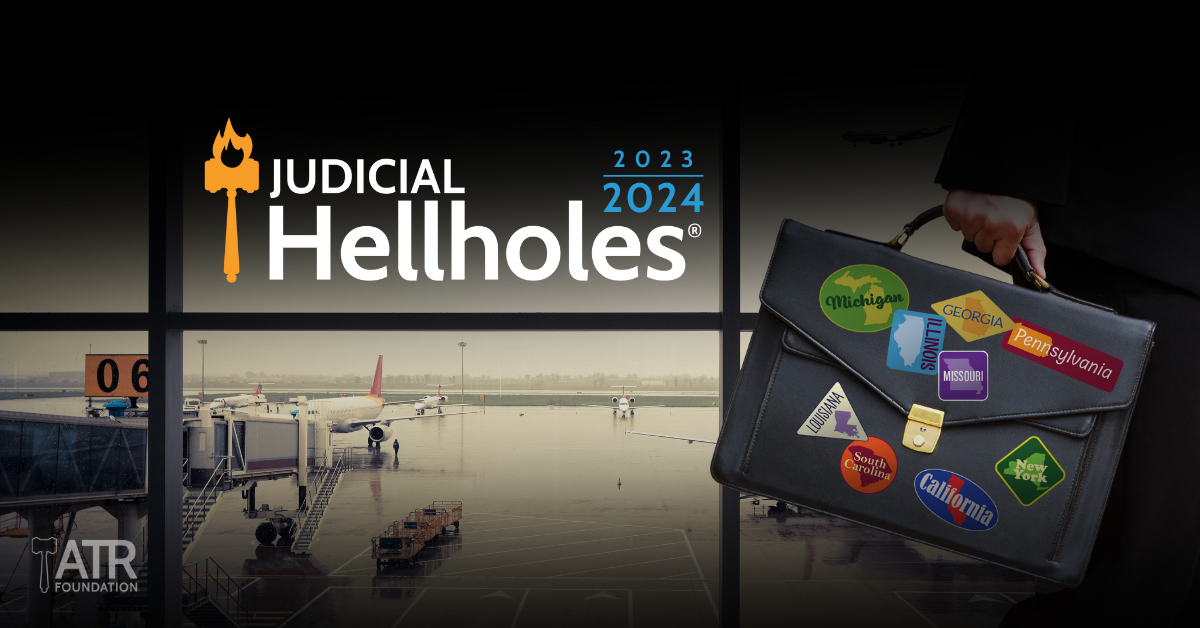Junk Science Front and Center in Recent Judicial Hellholes Verdicts
The changes to Federal Rule of Evidence 702 last year were supposed to be a watershed moment for expert testimony in U.S. courts. The amended rule definitively requires judges to act as “gatekeepers” in scrutinizing the reliability of expert scientific evidence. While the federal rule doesn’t expressly apply in all state courts, it sets the standard for all judges on this important procedure
Regrettably, talc cases in Judicial Hellholes demonstrate that junk science still permeates courtrooms as some judges continue failing to uphold this critical responsibility. Courts in South Carolina and Illinois persist in issuing questionable expert evidence decisions, ultimately resulting in multi-million-dollar verdicts.
Take, for instance, August’s $63 million verdict in South Carolina presided over by Judge Jean Hoefer Toal. The plaintiff in this case claimed that his mesothelioma was caused by his use of asbestos-contaminated talcum powder. The jury, however, wasn’t informed that he worked in a building later condemned for being “full of asbestos.” More troublingly, Judge Toal permitted the plaintiff’s firm, Dean Omar Branham Shirley, to introduce questionable evidence. The plaintiff’s expert, Dr. Steven Haber, offered evidence about an eleventh-hour analysis of lung tissue, even though the defendant didn’t receive the conclusions of the report until after the trial began.
Judge Toal’s bias regarding admissibility of expert testimony was highlighted further when the court effectively gagged the defendant’s principal witness, Dr. Ed Kuffner, the company’s chief medical officer. Dr. Kuffner was prohibited from discussing his independent knowledge regarding the presence (or lack thereof) of specific asbestos fibers in the company’s talc products, including winchite, a form of asbestos purportedly found in the plaintiff’s lung tissue.
If given the same opportunity as the opposing party’s witness, Dr. Kuffner would have explained that this specific form of asbestos was not found in talc mines used by the company when the plaintiff was using their product. Such inexplicable restrictions severely hampered the defendant’s ability to present a complete defense. Given these errors, the defendant company requested this $63 million verdict be set aside or that they be granted a new trial. No decision has been made yet with regard to whether the verdict or trial will stand.
There is, however, precedent for doing so. Just last month, a federal judge in Oregon tossed a $260 million jury verdict in a talc case against Johnson & Johnson. In this case, the same Dean Omar firm represented another talc plaintiff in Oregon’s 4th Judicial District Circuit Court, during which the firm’s attorneys committed a series of egregious errors. Throughout the course of the trial, the court sustained 223 objections to the Dean Omar Branham Shirley firm. The firm ignored these rulings in an effort to put inadmissible materials in front of the jury, forcing the defendant to repeatedly object. Ultimately, Judge Katharine von ter Stegge granted the defendant’s motion to toss the verdict and hold a new trial in the case.
Unfortunately, the firm’s antics were permitted to persist in Illinois. In October, Judge Patrick Sherlock upheld a $45 million talc verdict in the Cook County Circuit Court. The trial showcased, yet again, a judicial imbalance in the latitude afforded to plaintiffs’ experts compared to those for the defense. The court allowed Dr. Haber, again serving as the plaintiff’s expert, to lecture the jury for four days on topics far outside his expertise as a pulmonologist, including geology and talc mining techniques.
Dr. Haber admitted to taking “geology courses” just to testify, yet was permitted to opine on a wide range of technical subjects. The court here wasn’t only lax in its gatekeeping functions – it failed in them altogether.
Meanwhile, Dr. Kuffner again was harshly restricted in his testimony. The court prohibited him from discussing the history of the company’s talc business, actually stating that he had “no fricking knowledge” of it.
Even more concerning, the court shut down testimony from Dr. Rachel Damico, a renowned Johns Hopkins pulmonologist and an expert in genetic causes of cancer. Dr. Damico was precluded from testifying about hereditary mutations that could have caused the plaintiff’s cancer, effectively dismantling the defense’s ability to offer alternative causation theories.
These cases are not isolated incidents but part of a troubling pattern of weak gatekeeping in certain jurisdictions, underscoring why these courts maintain the dubious distinction of “Judicial Hellholes®.” The failure to apply rigorous standards like those outlined in Rule 702 can lead to “nuclear verdicts®” like these, based more on emotion and speculation rather than on sound scientific evidence.
The consequences of such leniency extend beyond individual cases as these excessive and high-dollar verdicts contribute to a litigation environment that drives up costs for businesses and consumers alike. in the U.S. result in a “tort tax” of $1,561 per person (or $6,244 per household of four) in addition to a loss of 4.8 million jobs when dynamic effects are considered.iv
It’s crucial to recognize that the role of judges as gatekeepers is not merely procedural, but fundamental to ensuring justice. Jurors cannot be expected to navigate complex scientific matters without proper guidance. When judges abdicate their responsibility to screen out unreliable expert testimony, they place an unfair burden on jurors and compromise the integrity of the trial process.
While we applaud those courts faithfully applying Rule 702, it’s clear that more must be done – especially in jurisdictions labeled “Judicial Hellholes®.” Judges must recommit to their gatekeeping role in an unbiased manner and rigorously evaluate the reliability of expert testimony – regardless of which side it favors.
Appeals courts must also stand at the ready to restore balance and scientific integrity to our courtrooms and, when necessary, overturn verdicts where trial judges fail in their gatekeeping duties.







